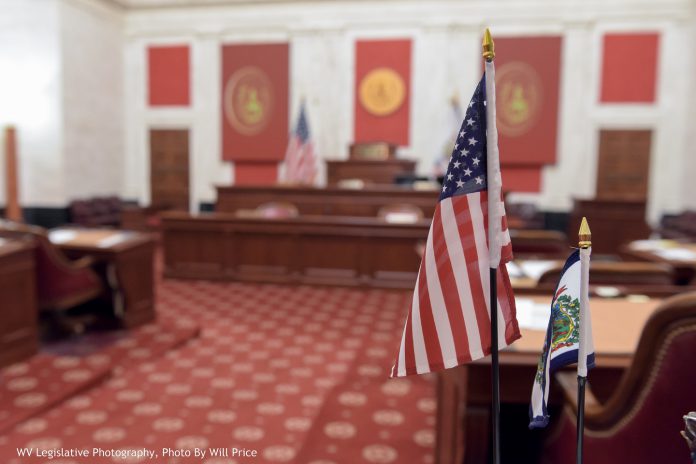As of 4 p.m. Wednesday, February 26, 2003, the 50th day of the 2003 Regular Legislative Session, 653 bills have been introduced in the Senate. Of those, 60 bills were passed this week and will be sent to the House of Delegates for its consideration. Among those passed were:
Senate Bill 430 would provide additional restrictions on outdoor advertising. Restrictions in the bill apply mainly to billboards and advertisements with a surface area of more than 300 square feet. Provisions would restrict multiple advertisements using one billboard structure and limit structures to one per location.
Senate Bill 112 would allow farm wineries to manufacture, serve and sell certain wines. The bill would require wines to have been matured in a wooden barrel or cask and have an alcohol content of no more than 22 percent by volume.
Senate Bill 205 would change the criminal intent for animal cruelty crimes. The bill would mandate that anyone who intentionally, knowingly or recklessly kills or poisons a companion animal be charged with a misdemeanor carrying a fine between $300 and $500. Provisions in the bill would exempt the person who kills or injures an animal that attacks a person or his or her pet.
Senate Bill 338 would establish a Medicaid buy-in program for certain individuals with disabilities. Competitively employed disabled individuals between 16 and 64 years of age who meet certain income requirements would be able to buy into the Medicaid program for $50.
Senate Bill 395 would grant temporary grandparent visitation during divorce action. To receive visitation rights, the bill would require grandparents to submit an application or petition to Family Court during the divorce proceedings.
Senate Bill 354 would impose penalties for operating or attempting to operate a secret drug laboratory. The bill would make such operations a felony and would mandate a fine between $5,000 and $25,000 and a prison sentence between one and five years.
Senate Bill 391 would reduce training requirements for certain State Police Cadets. The bill would allow the State Police Superintendent to reduce training requirements for cadets who have previously served at least three years as law-enforcement officers and were laid off.
Senate Bill 162 would remove certain vehicle license information for 19 year olds. The measure would prevent any third parties from receiving records of license suspensions, denials or revocations due to school attendance.
Senate Bill 342 would limit the time driver’s licenses may be issued to certain noncitizens. The bill would allow licenses to be issued only to cover the time the person is authorized to reside in the United States. The bill would impose a five year limit on such licensing.
Senate Bill 95 would increase the allowable length and width of motor homes, travel trailers and truck campers. The bill would require the Department of Highways Commissioner to publish annually the various maximum vehicle lengths with an official map of highways.
Senate Bill 399 would require criminal history checks for persons working with children on school property. The bill would require persons not employed by County Boards of Education but who work directly with children in grades K-12 to be fingerprinted by the West Virginia State Police. The fingerprints would then be run through a database to determine criminal history, if any.
Senate Bill 90 would increase the number of certain volunteer group sales exempted from consumers sales tax. Under the bill,
volunteer fire departments and volunteer school support groups would be allowed to hold fundraisers up to 18 times a year as long as those fundraisers do not exceed a consecutive 84-hour period.
Senate Bill 107 would create a Back-ToSchool Sales Tax Holiday for school supply purchases. The Tax Holiday would begin on the first Friday of August, 2003 and end the following Sunday. This would apply to items such as clothing, shoes, pens, binders and other school supplies costing less than $100 each. Computer purchases up to $750 would be exempt from taxation during this period as well.

